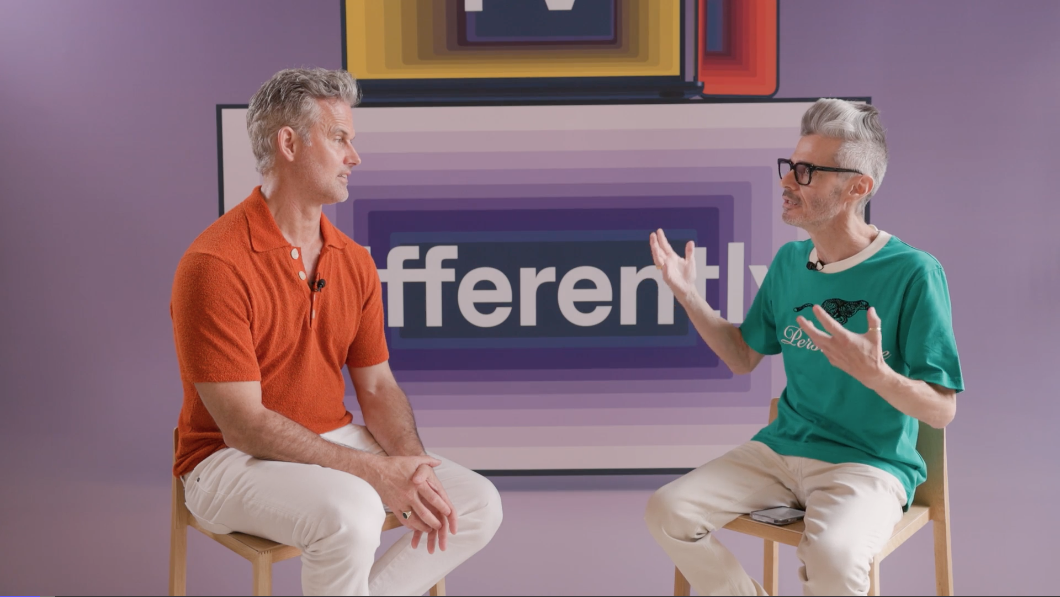Roaring Data At Cannes Lions

While at Cannes Lions, Media Cartographer Evan Shapiro shot a series of interviews with some truly big data brains.
In this first episode of Big Data Brains, Shapiro has a global discussion about the importance of local with R. Spencer Potts, who also hosted our show in Cannes, at Madhive's space, right in the thick of it all.
Evan Shapiro: I'm here with Spencer Potts, the CEO of Madhive, who's actually our host in this space. I like to assume that our audience has no idea what the heck we do for a living - So what is Madhive?
Spencer Potts: So Madhive is a software platform. We started in enterprise software, and the whole idea is to bring local businesses into the streaming ecosystem. So Adam Helfgott, founder, with another gentleman, Tom Bullock, who came out of Zynga - who saw the entire digital ecosystem in television as more of like a multiplayer video game - said, hey, can we figure out a way to bring very local businesses that want to market in very local spots, let's say a zip code or two, or even half a zip code, find very differentiated audiences and find the inventory.
So, as I'd like to say to friends at home, we try to put the local pizza shop or the local dealership on Hulu. And so what that takes is a decisioning engine, a device graph, and then a series of inventory providers. We've been able to put that all together and call it “full-stack” and be able to put local businesses on streaming television.
Evan Shapiro: Yeah, I think there's this bias or this just ignorance of the importance – there's the small and mid-sized businesses, but then there's the super local mom and pop shops who actually power a tremendous part of our tremendous share from the advertising economy.
Spencer Potts: Yeah, and we've always believed that – you know, our original partner was, the company that was part of Tegna, right, the broadcaster spawned out of Gannett, and it's called Premion. Matter of fact, Jim Wilson just joined us as president. So it's a little bit of a full circle to get him back into our environment.
The whole idea was, yeah, there's so many local stores that are trying to market and reach their audience, and it just kind of bubbles up into some of the regional players and the SMPs. And then of course, we have national brands.
So I think again, the power of the local economy, the power of the local merchant, the ability to now find their audience, where their audience is going. It was really a powerful story for us. And the trick was, if you will, and it was built by people far smarter than me, is to be able to do that at scale. So at any point in time, Madhive is running 20 or 30,000 campaigns.
Evan Shapiro: 20 or 30,000 campaigns? What's the average size of a campaign?
Spencer Potts: The average size is $4,000.
Evan Shpairo: Wow - that’s a conversation I have with these big sellers. It's like, you're focused on these eight figure deals, and that's great. But you know, 60% of the advertisers in the United States only buy YouTube. And they're buying at $1,500 levels.
Spencer Potts: Yeah, and so that was the real enjoyment and excitement about just powering the local economy. And we did make a bet on connected television. So that was like five years ago. Adam and Tom sat and said, “All right, we're going to make that bet.”
And fortunately it came to fruition. So we're excited to kind of lean in. And really the larger vision for us is to be able to – and I think you and I spoke about this earlier – start to really localize national, because there is of course that national blanket.
Evan Shapiro: What does that mean, localized national?
Spencer Potts: It means really taking the idea of: moving budget nationally around to local levels, as they see their over and under penetration for where they want to be. So, for example, if you're a large national brand and you see that you really want to target Detroit because all of your data shows that you want to get your stores going and try to figure out how to kind of get the consumer to buy more of your product.
Well then, do you have to go everywhere? If you want to focus on Detroit and then you hit the KPI in Detroit, which is what our platform allows you to see and measure…
Evan Shapiro: You can then define the budget?
Spencer Potts: That's the idea, is to really get the efficiency of spend play in the conversation. Which is a term that I'm starting to hear, “efficiency of spend, efficiency of spend.” That’s every marketer's dream. If you can get the most outcomes for the least amount of capital, you'll probably get two extra bonuses.
Evan Shapiro: If you contextualize your messaging around the local lives of your consumer, you're also going to build a better brand affinity at the end of the day with the consumer themselves.
Spencer Potts: Well said. We want to have a certain creative for a certain audience at a certain place in the economy and also a certain place in the country and spiel to make that dynamic at all times.
Because regardless of the product, you're going to be looking at it differently depending on culturally where you're from, how you see it. You know, how your kind of networking environment is around you. We believe in all of that precision, all of that customization. And the way that the technology is building out, you can have all those creatives and all those dynamics and kind of move them around. So we really appreciate all of the dynamic nature of the local economies.
Evan Shapiro: If you back up five years, you all placed a lot of chips on CTV. Now if you go out five years and look back to today, you're making a bet on a company you just acquired called Frequence.
So what do they do and why this bet now? And where do you see that paying off in five years?
Spencer Potts: Frequence is a business that, upon being in the marketplace with connected television, we ran into a couple times. Not really from a customer overlap perspective, but from reputation. They were using connected television, but they're also search, social, digital, out of home, etc. Truly interoperable.
And what they decided to do – Madhive is a technology company because we had to build the decisioning engine in the stack and again, to get all those campaigns at scale, it's very deep architecture technology – they built a workflow software platform that's omnichannel and they would hook up to technology pipes like Madhive.
So there's other DSPs out there they would use. And so when we saw them in the local marketplace and we saw them doing something that we believed in, which is not only offer connected television but offer all the other digital mediums, our larger vision is to be the digital advertising hub for SMBs. So this is a next play for us looking 12-18 months out on our roadmap.
We saw omnichannel as something we want under our capabilities, they have the software platform, which is a wonderful campaign management tool, and then we have the DSP that can kind of connect, whether it's display, connected television, digital out of home, etc. So that marriage right there made a lot of sense. And then we met the gang and they're just a terrific culture.
I mean, they've been in business for, I think now close to 15 years and just been exceptional talents and finding the local market and being able to offer all these tools. So they have the tool set for the smaller guy, if you will.
Evan Shapiro: There's that old phrase, and I can't remember who said it, “culture eats strategy for breakfast.” And I think people sleep on the importance of culture, and you all seem to have a really innovative culture. Especially the focus on the small and mid-sized businesses, but then there's the mom and pop, micro-businesses as well, I think that’s really brilliant, and I think future looking.
How do you see us all as an ecosystem, collaborating better around the use of data to just make everything more enjoyable for the advertiser on one end, but also for the consumer on the other?
Spencer Potts: This is where the management team at Frequence and the leadership team at Madhive sat down – the ability for them to bring 15 years of data around their omnichannel campaign management and our data, connected television, that marriage through our device graph – we saw the way to find the fidelity and the measurement of that data to be somewhat unique because it never has to leave the ecosystem.
We can keep it within the Madhive-now fold. We also believe in, I think what you're hearing in some of these new companies that are being developed, kind of the futuristic nature of having a federated network where data can actually be queried and we can start to access companies we've never been able to access before because you could do it in a privacy compliant way.
So I think it's our responsibility, to your question, to figure out ways to get the best, most precise first party data. Yes, make sure you can prove provenance. Yes, make sure that there's privacy. And also make sure that there's value attribution so people will actually be empowered and feel responsible to share their data as long as they check the privacy box and check the provenance box. And candidly have new compensation rails.
So there's some really innovative companies out there. And so I think that's the future. I think it's a step forward from even the current clean room system. And I think Madhive wants to be in the center of that conversation. We're working on partnering with companies to figure out how quickly we can get there, so that we can bring the most precise audience segments to our customers and make sure that they get that targeted message to the right people.
Evan Shapiro: When talking about localizing national, there's this great phrase, “think globally, act locally.” Is that the piece of advice you would give to big brands in the world?
Spencer Potts: I think there's no better line that I could end with. And I really appreciate it, because that's exactly where I think we should be as a society. Make sure that everybody, regardless of their size and stature, gets the message that's right for them to kind of help empower their own environment. I think it's wonderful.
Transcript edited for brevity and clarity.

